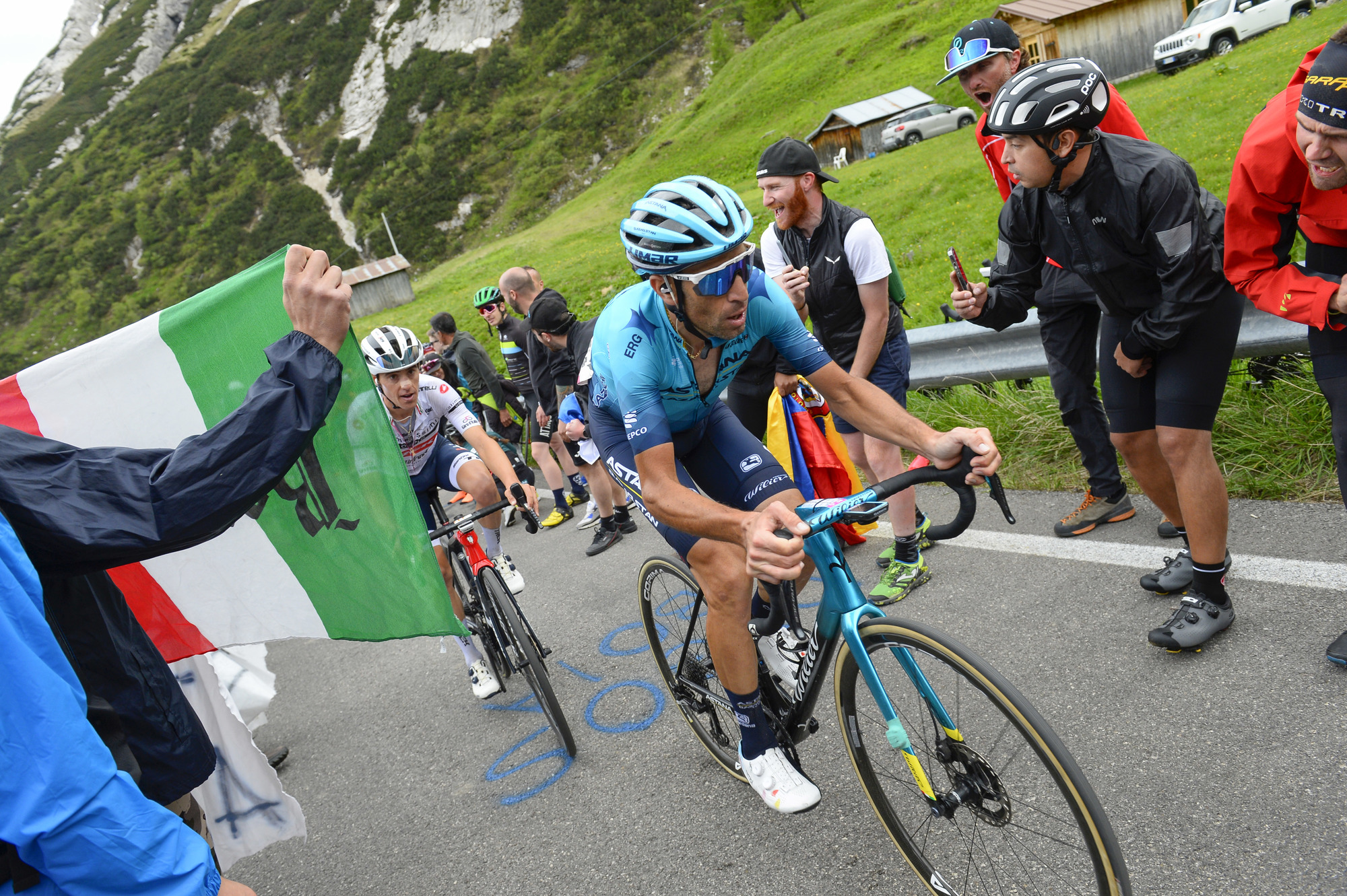Nibali: I wanted more but I’m still satisfied with final Giro d’Italia
Italian’s fourth place on GC compromised chances of farewell stage win

Vincenzo Nibali (Astana Qazaqstan) never liked the Marmolada, so perhaps it was only fitting that it would be the final mountain he ever climbed at the Giro d’Italia. There would be no second thoughts about coming back and doing this all over again next year.
“After the effort I put in today, certainly not,” Nibali smiled in the mixed zone after he had all but sealed fourth place overall in his final Giro.
“Right now, the main emotion is tiredness. The Marmolada has never been my favourite climb. I’d rather do a Zoncolan than the Marmolada, it’s a climb with such steep slopes, where you can’t breathe properly… I just tried to focus on keeping my tempo steady and trying not to lose too much time to my rivals on the way up.”
Nibali was distanced as the gradient began to bite on the Passo Fedaia, and he knew better than to force the issue. While Jai Hindley (Bora-Hansgrohe) was travelling to places he couldn’t reach while divesting Richard Carapaz (Ineos Grenadiers) of the maglia rosa, Nibali was two minutes down the climb, calmly limiting his losses to maintain his place in the standings.
Ahead of Sunday’s final time trial in Verona, Nibali remains fourth overall, now 7:57 down on Hindley, but with a buffer of more than a minute on Pello Bilbao (Bahrain Victorious). Although Nibali has fallen short of the podium, he is set to be feted in the Arena on Sunday afternoon for his contribution to the history of the race. The overall victories of 2013 and 2016 tell only part of the story; Nibali defined an era at the Giro.
“The Giro was sort of my home because I was often on the podium, even if I didn’t manage that this year,” said Nibali. “I provided a lot of emotions, but the race provided me with a lot of emotions too.”
Nibali began this Giro with a free role in an Astana Qazaqstan team led by Miguel Ángel López and his overall hopes looked to have ended when he conceded more than two minutes on Mount Etna on stage 4. A day later, when Nibali availed of the Giro’s visit to Messina to announce his retirement at season’s end, a stage win looked to be the summit of his ambition.
Get The Leadout Newsletter
The latest race content, interviews, features, reviews and expert buying guides, direct to your inbox!
Come the end of the second week, however, Nibali was improbably back in the hunt for a podium place after he delivered his finest set of climbing performances in at least three years. After limiting his losses gamely on the Blockhaus on stage 9, Nibali was among the aggressors in the breathless outing around Turin on stage 14.
Nibali had the clear intention to sign off on the Giro with a stage win, but he found himself hemmed in by his elevated position in the overall standings, a victim of his own surprising form. There was never any prospect of infiltrating an early break, and there was only a remote possibility of escaping Hindley, Carapaz et al.
“It’s certainly a great result, but maybe the ambition was for something more,” Nibali said. “I was hoping to try to win a stage, because raising your arms to the air is always a unique emotion. I went close in Turin. It was the day where I was riding best, I was up there with Hindley and Carapaz, and they rightly marked me, but they were going much better than me too.”
A Giro at this level seemed fanciful before the race began. When Nibali returned to Astana this season, he had toyed with the idea of riding all five Monuments, but illness ruined his spring campaign. His old mentor Giuseppe Martinelli did what he could to revive morale.
“When I had physical problems in the spring, I wanted to throw everything up in the air and stop, but then Martino, who knows me more than anyone, told me: ‘Just get on your bike and do what you like',” Nibali said. “That gave me the energy to start again, and now I’m here. I can be satisfied with this Giro.”

Barry Ryan was Head of Features at Cyclingnews. He has covered professional cycling since 2010, reporting from the Tour de France, Giro d’Italia and events from Argentina to Japan. His writing has appeared in The Independent, Procycling and Cycling Plus. He is the author of The Ascent: Sean Kelly, Stephen Roche and the Rise of Irish Cycling’s Golden Generation, published by Gill Books.